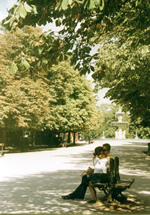 Dancing alone.
Dancing alone.I remember being at a milonga waiting for someone to ask me to dance the next tango. Couples swirled about me. And until I got to dance, I felt the absence of a partner deeply, intensely, no matter how discreetly poised I might sit at the end of my chair, enchanted by the dances unfolding before me.
Traveling alone in Madrid one August, I would see lovers sitting at benches, lovers holding hands, kissing, as if their pleasure was public, a story told only outdoors, as if their pain, arguments, separations, bereavements, were reserved for private occasions, behind closed doors. They say Paris is the city of lovers … but I’m not convinced. Paris cannot claim possession of something so universal.
Paris only adopted, but didn’t invent, the tango.
Someone once told me that in Buenos Aires couples always displayed their affection publicly, but not because of some cultural tendency toward exhibitionism. No. The explanation is quite simple really. They don’t have the luxury of privacy. Young adults live with their parents and aging parents live with their children.
El dia que me quieras … the day that you might love me. That day of possibility was born in Buenos Aires, in the throat of Carlos Gardel, but that day has never come. It can’t.
You see, tango takes place in this space of waiting, this space of possibility. Love is no different. And so is writing.
Writing takes place in the space of loneliness, where I see more keenly, my vision clear, not muddied by passion. I walk, write, eat, drink alone, a witness to life that seems much more real than the blank page. And when you finally ask me to dance, the plenitude of your embrace is blinding. I forget my words.
These lovers unwittingly tell me their stories. They are dancers embracing on the theater of the street, repeating that ageless ritual, a tango that takes place in public parks, sidewalks, restaurants, alleys, taxicabs. Lovers strolling, lovers saying goodbye at the train station, coming and going, lovers defying unto death the loneliness of the individual in the big city.
I still dance the tango, it carries me into the night, accidentally, unconsciously, and before I know it, I am shoved by the city’s pulse into the arms of the night, dancing this tango, the dance of drinks, of furtive kisses in a smoke-filled bar, of groping, of syncopated push and pull, of escorted walks to the hotel, of steps resonating in the alley, slowing down around the dark corner, the tango of begging, refusal, the tango of her cruelty and his banality, of his urgency and nothing more, that late-night dance of the American writer and the Spanish man who thinks she’s easy because she’s a tourist.
 I think of that painting in the Thyssen B Museum, Hopper’s Hotel Room (1931). I imagine my body as a hotel room for transient happiness, an impermanent residence for would-be lovers. But I am so in love, deeply, irrevocably in love with this place, this freedom, this freedom to write, this freedom to dance, so in love with so much more than the image of that woman sitting at the edge of a bed in a hotel room, and for this reason alone, I refuse them. I refuse them all.
I think of that painting in the Thyssen B Museum, Hopper’s Hotel Room (1931). I imagine my body as a hotel room for transient happiness, an impermanent residence for would-be lovers. But I am so in love, deeply, irrevocably in love with this place, this freedom, this freedom to write, this freedom to dance, so in love with so much more than the image of that woman sitting at the edge of a bed in a hotel room, and for this reason alone, I refuse them. I refuse them all.And so I claim that Madrid is a city of lovers. And that the day for all of us to love has finally arrived.
And I dedicate this tango to all lovers, to all lovers everywhere, to lovers of bodies, souls and cities, lovers of past, present and future, lovers who hold hands and lovers who dance alone.

No comments:
Post a Comment